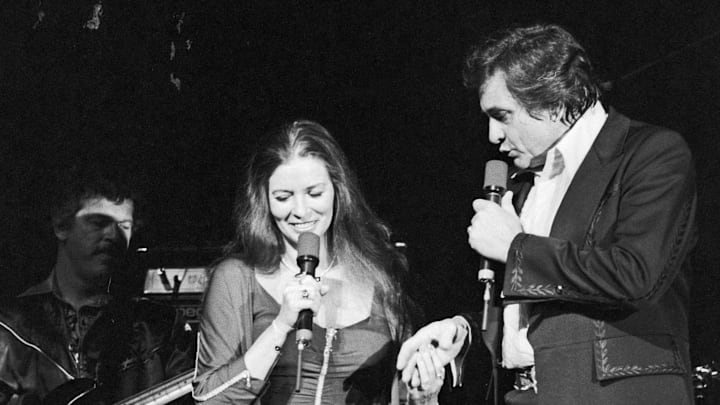1960s/1970s – The birth of the outlaws
The first successful pushback against the hegemony of Nashville came from several country music veterans who had grown tired of Music Row’s control and had enough juice to make a break. Willie Nelson had been writing songs and releasing albums for a decade, and Kris Kristofferson was a new kid struggling to make it. But both singer/songwriters had seen what Bob Dylan was doing and they wanted in.
Waylon Jennings was already a country star, but he had begun his career playing bass for Buddy Holly and was chafing to incorporate more rock & roll than his Nashville overlords would allow. Willie left Nashville for Austin, and others soon followed. The outlaw movement – country artists who weren’t going to kowtow to Nashville – had begun. But it didn’t spring out of nowhere. There were signs throughout the 1960s.
“I’ve Got a Tiger By the Tail” by Buck Owens (1964)
Buck Owens was pure country. He co-hosted the most popular national show built around country music – Hee Haw - throughout the 1970s. But he was among the first popular country artists to be associated with somewhere apart from Nashville. Along with Merle Haggard, Owens helped invent the rock-influenced, guitar-based “Bakersfield Sound.” That honky tonk vibe would pave the way for the outlaws that would follow. “I’ve Got a Tiger By the Tail” was just one of many hits that featured Owens' easy sense of humor and toe-tapping beats.
“Jackson” by Johnny Cash and June Carter (1967)
She would soon be known as June Carter Cash when they married. June was from the first family of country music, the Carters, and Johnny was the ne’er-do-well outsider who was challenging many of country’s truths. Together, they were magic. “Jackson” was from their first album of duets, a playful rockabilly number which shows off their sense of humor. It had been done by other luminaries, including bluegrass titans Flatt and Scruggs, but no one did it better than Johnny and June.
“Fist City” by Loretta Lynn (1968)
The “coal miner’s daughter” recorded one of the definitive statements of country music – stay away from my man. It marked a new freedom for female recording artists in Nashville. A decade earlier, pioneering female country artist Jean Shepard had lamented the restrictive role allowed to women in “Two Whoops and a Holler.” But then the 1960s happened.
Loretta Lynn was there to state that women could step up a little bit more. It wasn’t exactly all-empowering – they could only display power in defense of their traditional role as a man’s woman – but it moved the needle. She would move the needle even farther – and with much more pushback from Nashville – seven years later with “The Pill.”
“Good Hearted Woman” by Waylon Jennings and Willie Nelson (1971/’76)
It first appeared on Waylon’s 1971 album of the same name, and five years later, he recut it as a live version of their outlaw album. The catalogs of both singers are jam-packed with a wide range of country songs, from tender ballads to rockabilly burners. “Good Hearted Woman,” inspired by a reference to Tina Turner, is a boisterous concoction about that same old country double standard that female artists would be forever exploring.
Here, you get the two towering figures of outlaw country at their most relaxed. It would be another decade before they reconvened as the Highwaymen, one of country music’s first supergroups.
“I’ve Been to Georgia on a Fast Train” by Billy Joe Shaver (1973)
Billy Joe Shaver was one of the new breed of outlaws who badgered Waylon Jennings into recording his songs and then launched his own career. The stories of Billy Joe’s wild exploits could fill a couple of volumes in any history of country music. And his lyrical ability was unsurpassed. “I’ve been to Georgia on a fast train – I wasn’t born no yesterday – I got a good Christian raising and an eighth-grade education – Ain’t no reason y’all treating me this way” may be more timely now than when he wrote it fifty years ago.
“Dallas” by the Flatlanders (1974)
They were a myth for a long time. In fact, their breakthrough didn’t come for twentyish years with the release of the aptly-titled More a Legend Than a Band. But the Flatlanders – Jimmie Dale Gilmore, Joe Ely, and Butch Hancock – were putting out neo-traditional country long before that was a thing. “Dallas” is a gorgeous country creation riding on Gilmore’s tremulous tenor and Ely’s singular guitar.
One additional pick for you here. Not a song, but a movie and its soundtrack. In 1975, Robert Altman released Nashville, one of the greatest of all American films. The story follows a large group of disparate Nashville characters who coalesce around a presidential campaign in the year of the nation’s bicentennial.
The soundtrack album features original songs, often written by the actors themselves to be performed as part of the constant swirl of music that propels the movie forward. The songs mostly hew close to the countrypolitan ethos that Nashville was promoting at the time. Some are quite good, while others are not, but as a whole, they represent a lot of what Nashville was by the mid-‘70s. See the movie if you can – but the soundtrack can stand alone if need be.
All right, that’s a dozen songs, plus one album to get you started on your newfound embrace of country music. Next time, we’ll check out a dozen more songs from the last part of the century, a transitional period that witnessed both birth and rebirth throughout the country music scene.
